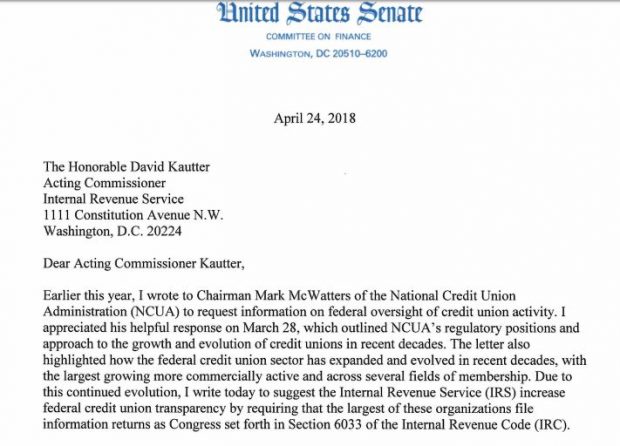
Senate Finance Chairman Orrin Hatch (R-Utah) is asking the IRS to require federal credit unions to file annual information returns with the agency in an effort to ensure that they are complying with the role Congress gave them.
In a letter today to Acting IRS Commissioner David Kautter, Hatch said if the IRS chooses to require federal credit unions to file Form 990, it could require just the largest and most complex to file.
And he made it clear that the IRS has the power to institute this requirement now and does not need congressional approval to do it.
Under federal law, federal credit unions don't have to file the informational return. However, state-chartered credit unions must file the document even though they are tax exempt.
Hatch has questioned whether the credit union tax exemption is outdated.
“Congress provided this exemption for express purposes and has an obligation to maintain oversight of credit union activity to ensure that they continue to fulfill its intended vision,” he said in his letter to the IRS.
He said that Congress and the IRS have the responsibility to monitor whether credit unions still deserve the tax exemption.
Hatch said that in recent years, the NCUA has relaxed field of membership rules, expanded commercial lending and permitted the use of alternative capital under certain circumstances.
“While these are all well-intentioned decisions, they should give us occasion to pause and review the current state of America's largest credit unions,” Hatch said.”
He added that since federal credit unions were given their exemption, “there is no question that federal credit unions have grown in size and complexity, which should give us pause to reflect whether that exemption is still warranted.”
Hatch's letter follows a letter from NCUA Chairman J. Mark McWatters in which the NCUA chief said that if Congress chose to repeal the exemption, it would have a devastating impact on the share insurance fund and could result in a taxpayer bailout.
Credit union trade groups on Monday praised the McWatters response.
“The NCUA has thoroughly responded to Chairman [Orrin] Hatch's inquiries, with specifics laying out how the loss of the credit union tax exemption would impact credit unions and the American taxpayer,” said NAFCU Executive Vice President of Government Affairs and General Counsel Carrie Hunt.
CUNA President/CEO Jim Nussle said that Hatch had asked reasonable questions.
“In response, Chairman McWatters correctly states that Congress has conveyed the credit union tax status based on credit unions' structure as not-for-profit financial cooperatives and their mission to promote thrift and provide access to credit for provident purposes,” he said.
However, the American Bankers Association was not so impressed.
“No one wants to eliminate the federal tax exemption for all credit unions — just for the five percent of institutions that enjoy 75 percent of the tax exemption,” said BA spokesperson Jeff Sigmund. “The fact that NCUA claims that credit unions would need a taxpayer bailout without the tax exemption is extremely troubling and raises more questions than it answers. Maybe if they spent less on stadium naming rights deals and exorbitant executive compensation packages they wouldn't be in this situation.”
© 2025 ALM Global, LLC, All Rights Reserved. Request academic re-use from www.copyright.com. All other uses, submit a request to [email protected]. For more information visit Asset & Logo Licensing.







